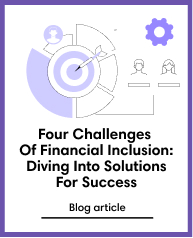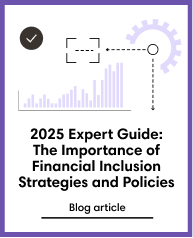Financial Inclusion
Sep 17, 2021
What it will mean when everyone can participate in the economy
Subscribe to our newsletter
Through the past few years, the market has seen financial technology progress in leaps and bounds. In just the last decade, cross-border transactions, online banking, virtual wallets, and other similar tools have gone from cutting-edge developments to things people use in their everyday lives. Progress in financial technology has been inextricably linked with economic growth, for the reason that tools such as the ones mentioned above allow small-to-medium enterprises to access opportunities like peer-to-peer lending or internet banking. Certain tools enhance the competitiveness of a business, enabling them to extend opportunities to more people.
Unfortunately, not everyone has benefitted from the recent progress in tech and the economy. Even in 2021, marginalized groups around the world face barriers to full participation in the economy. Women in many countries, for example, face barriers such as cultural norms, legal obstacles, and market failure just to be able to work in certain countries. Many unbanked people—which in countries like the Philippines still make up a majority of adults—can not access important loans they need to start a business.
Not allowing everyone to participate in the economy can have dire consequences.
The impact of exclusion, the opportunities of inclusion
Arguments for allowing full economic participation have been made by firms such as PricewaterhouseCoopers. Developed countries, they say, will have to acknowledge the impact of falling birth rates on the labour force. Emerging economies, on the other hand, will need all hands available to keep up with rising production demand.
Additionally, figures from the OECD Development Centre show that gender-based discrimination in social institutions costs up to USD 12 trillion for the global economy. Gradually reducing discrimination in social institutions could lead to an annual average increase in the world GDP growth rate of 0.03 to 0.6 percentage points by 2030.
It is also believed that financial inclusion aids inclusive growth, economic development, and financial deepening. According to studies from the Asian Development Bank, financial inclusion helps to lower poverty and income inequality when overall economic conditions empower people to use access to finance for productive purposes such as expanding a business or investing in children’s education. It is also reported that digital finance (the access and usage of formal financial services by the excluded population) alone could benefit billions of people and result in inclusive growth that would add $3.7 trillion (USD) to emerging economies in a decade.
Reaching out
Tackling issues of exclusion and discrimination start with crafting policies that explicitly tackle the problems at hand. The good news is that movements to allow for fuller economic participation have already taken off: 40 economies around the world have enacted reforms that will help women contribute to economic growth and development, says a new World Bank study. Reforms included expansion of the amount of paid maternity leave available to mothers, the introduction of paid paternity leave and prohibition of dismissal of pregnant employees.
Legal and regulatory reforms that make it easier for marginalized groups to access much-needed opportunities not only improve the lives of people themselves but also their families and the communities around them.
Yet aside from reforms, it’s also important to look at if new tools are being used to empower inclusivity. For instance, various new credit scoring apps have emerged in order to pave the way for alternative credit scoring. Alternative credit scoring makes it easier for the unbanked to be validated by a lending institution for a much-needed loan.
Firms such as credolab demonstrate the power of a new approach to digital credit scoring. Using alternative data such as navigation records, smartphone use, bills payment records, and more, credolab helps lending institutions pull up a real-time credit score for any loan applicant and help expedite the loan process. The technology used by credolab also holds fraud SDK capabilities to spot loan applicants with a history of missing payments and/or fraud. The result is a digital credit bureau score that circumvents the need for an extensive banking history—a game-changer for the many unbanked who may need a crucial loan for starting a business or investing in education.
In conclusion, too many people are still denied the chance to fully participate in the economy—whether it’s because they’re a woman, excluded from financial systems, or part of another marginalized group. Businesses, governments, and other organizations need to understand that they need to go out of their way to make sure that people will be able to work when they want, avail of crucial financial services, and generally maximize their potential. Though it will be hard work, the ensuing economic growth and countless lives improved will make it worthwhile.





